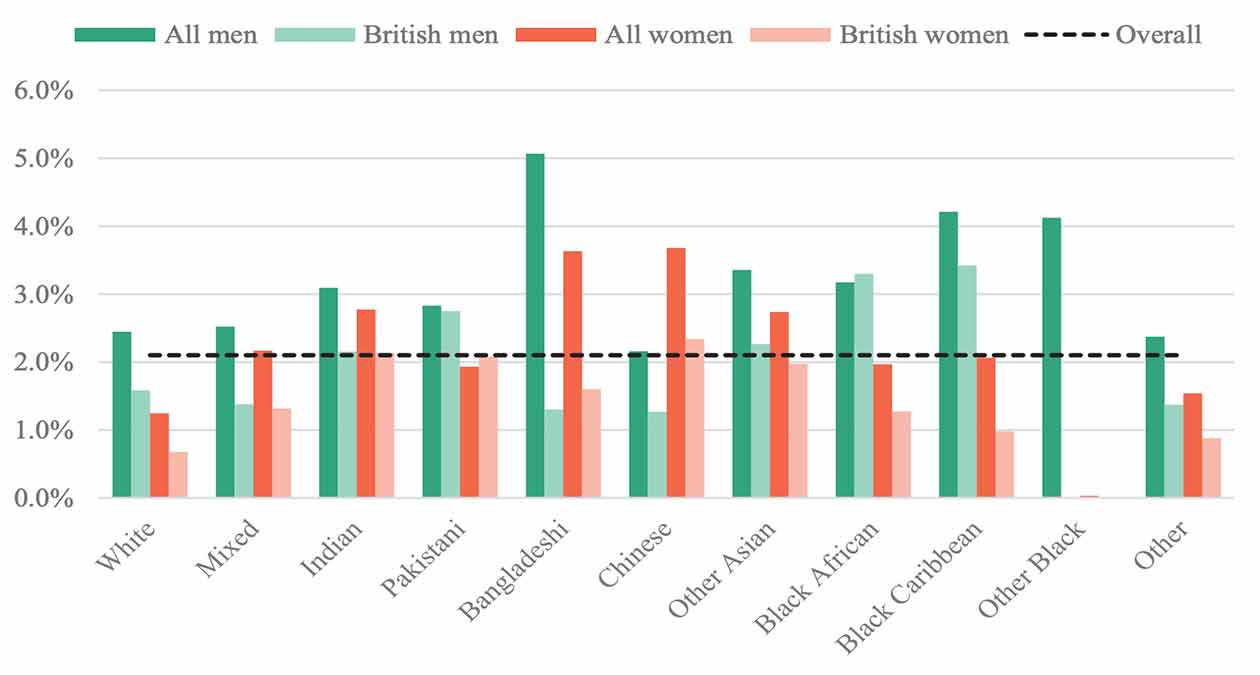Introduction
Economists are central to policymaking in the UK and internationally, and to providing the research that underpins policy decisions. Despite this important role in society, economists are not representative of society.
We study academic economists and students in the UK, and consider differences in the representation of ethnic groups in academia and the possible reasons for these differences.
Main findings
- Ethnic diversity among academic economists is increasing over time. The share of ethnic minority academic economists has increased from 19% to 24% between 2012 and 2018. This share is higher than UK academia overall and the UK population. However, there are large differences across ethnic groups, with Chinese and Indian economists over-represented and Black economists under-represented relative to their share in the UK population. These patterns are similar to those across UK academia as a whole.
- These differences are more pronounced when focusing on Russell Group universities, a self-selected association of research-intensive universities. While more than 50% of White academic economists work in Russell Group universities, this share is around 30% for Pakistani and Bangladeshi economists and lower than 20% for Black economists.
- Considering the nationalities of economists in UK universities reveals that a majority of ethnic minority economists are not British: most ethnic diversity in economics is imported.
- Among undergraduate economics students, the ethnic minority share has increased from 34% to 38% between 2012 and 2018. Again, this is higher than the share in other subjects, with economics particularly popular among Chinese and Indian students. The decision to study economics at A-level appears crucial: 70% of undergraduate students take economics at A-level, and conditional on doing so, a similar proportion (20-25%) of most university students choose an economics degree, regardless of ethnic group.
- Ethnic minority students are less likely to achieve a good degree (first class or upper second class honours degree). Indian students are 5 percentage points less likely to achieve a good degree, and Black Caribbean students are nearly 20 percentage points less likely to do so. This is after controlling for a set of observable characteristics and prior attainment. This ‘attainment gap’ may be part of the explanation for why some groups are less likely to continue to postgraduate study and thus remain under-represented in academia.

Authors’ main message
Under-representation starts at school. Ethnic differences in enrolment into an undergraduate program in economics largely reflect differences in the prevalence of holding an Economics A-level. Ensuring the availability of Economics A-levels and promoting an understanding of the subject among prospective students seems crucial.
Ethnic minority students graduate with lower outcomes than White students. This might be a barrier for these students to go on to study a PhD. Further research is required to understand what leads to this gap in order to inform solutions that can support greater diversity across the economics profession.
References
Advani, A., Sen, S. and Warwick, R. (2020) Ethnic diversity in UK economics. IFS Briefing Note BN 307.
© MiSoC December 2020 DOI: 10.5526/misoc-2020-002
Explainer Download